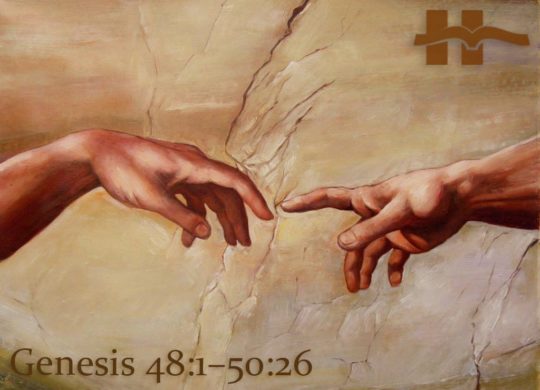Genesis 48:1–50:26

Agents of divine blessing remember the blessings of the past, pass on the blessings in the present, and expect the consummation of blessings in the future.
This pericope concludes the Joseph Story and the book of Genesis.
The first section, Gen 48:1–49:27 describes Jacob’s blessings upon his sons and grandchildren.(Though their lives may have overlapped, none of the other patriarchs before Jacob are shown to have any interaction with their grandchildren.) And, three times Jacob makes the point that his remains must be returned to the Promised Land for burial with his ancestors (47:29–31; 48:21; 49:29–32). This was in accordance with the divine promise made to Jacob that God would return him to Canaan (46:4), and so Jacob’s declaration was an act of unyielding faith in God’s word.
But not everyone addressed in Jacob’s last will and testimony obtains a blessing; there are curses as well. The faithfulness (or not) of the sons of Jacob would be consequential for their experience (or not) of divine blessings—both by themselves and by others. This, of course, is not a new theme in Genesis. All throughout, the lives of the various protagonists have demonstrated what it means to partake of (or miss out on) divine blessings as the result of their faithfulness (or lack thereof).
The recounting of Jacob’s death and burial (49:29–50:14) consumes most of this pericope, and is the longest of its kind in Genesis, perhaps in all of the OT. Not only is this appropriate for the patriarch, Israel, who would be the father of the nation, Israel, it also emphasizes Jacob’s constant demand that his remains be returned to the “homeland” in anticipation of the fulfillment of God’s promises to him and to his descendants. Likewise, Joseph’s final utterance deals with oaths (50:24–25): the first oath is one made by God regarding the Promised land; the second is the oath being sworn by Joseph’s siblings regarding taking his remains back to that same land. The past oath of deity becomes ground for the present oath of humanity. All of this—the final statements of both patriarchs, Jacob and Joseph—is thoroughly based upon God’s sovereign word and reflects an utmost trust in the ability of deity to bring about what he had promised.
Before Joseph plans the disposal of his own remains (50:22–26), a final reconciliation between this son of Jacob and his brothers remains to be accomplished. While Joseph’s intent to forgive had already been made evident in 45:5the brothers had until now never asked for forgiveness. So, still feeling guilty and afraid (50:19, 21), they send an emissary to Joseph and ask for his forgiveness (50:16), confessing their “transgression,” their “sin,” and their “wrong”: “please forgive” occurs twice in 50:17. They appeal for his forgiveness as they name “the God of your father” whose slaves they are—an implicit entreaty that Joseph act like that God, “who forgives iniquity, transgression, and sin” (Exod 34:7; Ps 32:1, 5; 103:3; 130:3–4; Mic 7:18). And Joseph does (Gen 50:19–21), affirming divine sovereignty and providence. God’s sovereign design was “to keep many people alive” he declares (50:20), and so it continues to be, as the Abrahamic blessing echoes across generations (12:3; 18:18; 22:18; 26:4; 28:14).
Thus, throughout the book, the narrator of Genesis has managed to keep the focus squarely upon divine blessing. The book began with God’s intention to bless humanity, a plan thwarted by the sinfulness of mankind. God then chose the family of Abraham to be the vehicle of his universal blessing, the fullness of which could only be experienced by faith of the kind exercised by Abraham, the one who feared God. Jacob’s life was characterized by a series of missteps in his vain attempt to secure divine blessing by his own stratagems, and with his own resources. He finally obtains the blessing in a posture of surrender. Joseph’s story then continues the drama, narrativally depicting what it takes for God’s children, in turn, to be the agents of his blessing, both for their own families, as well as for those around them, even as they look to the future for the consummation of God’s promises.











 Abe Kuruvilla is the Carl E. Bates Professor of Christian Preaching at The Southern Baptist Theological Seminary (Louisville, KY), and a dermatologist in private practice. His passion is to explore, explain, and exemplify preaching.
Abe Kuruvilla is the Carl E. Bates Professor of Christian Preaching at The Southern Baptist Theological Seminary (Louisville, KY), and a dermatologist in private practice. His passion is to explore, explain, and exemplify preaching.